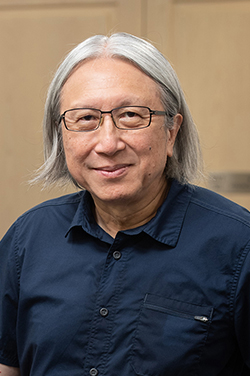Chan Koon-chung


Mr Chan Koon-chung
Honorary University Fellow (2020)
EM Forster once said, “The historian records, but the novelist creates.” Chan Koon-chung has had a varied and colourful career. Starting out as a reporter and magazine publisher, he ventured into film and other media industries, before progressing to write books. His cultural journey is both fascinating and exceptional, and his writings bear out Forster’s observation.
Born in Shanghai, Mr Chan grew up in Hong Kong and studied Sociology and Political Science at the University of Hong Kong. Upon graduation, he went to Boston University in 1974 to pursue graduate studies in Journalism, and it was there that he was enlightened by some radical scholars and experienced his first taste of counterculture.
Inspired by the underground weeklies for young people in Boston, Mr Chan founded City Magazine in 1976 after briefly working for The Star as a reporter upon his return to Hong Kong. The cultural magazine, of which he was chief editor and later publisher for 23 years, quickly gained popularity and became the must-read magazine for the bourgeoisie and intellectuals at the time.
A movie fan, Mr Chan ventured into the film industry as a screenwriter in the 1980s when Hong Kong cinema was in its golden era. His first screenplay, Hong Kong 1941, was directed by renowned Hong Kong director Mr Leung Po-chih, and it was nominated for a Hong Kong Film Award for Best Screenplay. He later collaborated with many more notable directors and was involved in the production of around a dozen Hong Kong movies and three U.S. movies, including Eat a Bowl of Tea, which was produced by Hollywood director Wayne Wang.
By the early 1990s, Mr Chan had started to set foot in international media ventures in the Greater China region, including establishing a cable television station in Taiwan where his screenplay The Story of a President was later turned into his first Chinese novel. Despite all the success gained along this cultural journey, Mr Chan was never complacent, and always maintained a tireless work ethic. It was not until 2003 that he became a full-time writer.
Mr Chan has so far written 25 books. In his novels, he attempts to expose the social phenomena present at a given time. His journalism career has empowered him to observe detailed changes in society and how people react to, and deal with, these shifts. He also inherently shows in his books the contradictions that people face in terms of the social, cultural and economic fabrics of our ever-evolving society. His sensitivity to cross-cultural issues, enriched by his exposure to the values of both the East and West, is reflected in his work.
Mr Chan’s most notable books are undoubtedly The Hong Kong Trilogy and The China Trilogy. The former, which comprises three books about Hong Kong, namely The Dreaming of Sunscreen (1984), Nothing Happened (1999) and Can Do Cafeteria (2003), chronicles the social and political changes in Hong Kong in the pre- and post-1997 eras. The continuous economic boom in Hong Kong and the Mainland has provided opportunities for people to continue pursuing their materialistic dreams, to the extent that they have, according to Mr Chan, ignored the changes around them, as if nothing has happened.
As a Sinophone writer, Mr Chan has always wanted to write about China. Having worked and lived in the nation for more than a decade, Mr Chan has witnessed the phenomenal economic growth on the Mainland, and how it has sprouted, albeit unknowingly, steady and subtle changes across the country. He wrote The Fat Years in 2009, describing the younger generation in Beijing whose sole purpose in life is to chase after wealth and material comforts. In particular, it details their seemingly oblivious attitude towards the harsh days which had come before, and how they have lost grip of the core values in life. The book quickly attracted worldwide attention, and was translated into 13 foreign languages, making Mr Chan an influential figure on the international writing scene.
Mr Chan’s two subsequent books on China, The Unbearable Dreamworld of Champa the Driver (2013) and The Second Year of Jianfeng – An Alternative History of New China (2015), also gained great attention among the world’s literati. Through Champa, the chauffeur, China’s broad ethnic perspective is reflected, and issues such as social inequalities, commercialisation and cultural changes in Tibet are discussed. The fiction work The Second Year of Jianfeng invites readers to imagine how things might have evolved had the political wheel of fortune turned in the other direction, and it tempts readers to surmise an alternative future. These three books were later published in a bound volume: The China Trilogy.
Mr Chan’s novels have been highly acclaimed. In 2016, his book The Second Year of Jianfeng – An Alternative History of New China was highly recommended by the judges of HKBU’s prestigious “The Sixth Dream of the Red Chamber Award”. The book was also selected as one of the “Twenty Chinese Novels 2001-2015” by the National Culture and Arts Foundation in Taiwan, and it was listed in the “Ten Chinese Novels 2015” by Yazhou Zhoukan (Asia Weekly). In 2013, Mr Chan was appointed Author of the Year at the Hong Kong Book Fair, where he shared his inspirational thoughts at three full-house seminars to over 1,300 attendees.
Mr Chan’s writings employ vivid imagination fortified with a significant measure of courage, thus enticing readers with a heady and fragrant bouquet. While readers may forget the exact details of what he has written, they will never forget the sentiments his novels have aroused, all of which allow us to see the world from another perspective. His books have inspired thought amongst intellectuals and facilitated constructive dialogues and expositions on China.